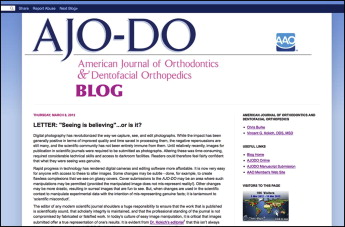When I wrote my second editorial for the AJO-DO for the February 2011 issue, I titled it “You have the final word.” The purpose of that editorial was to emphasize the importance of reader feedback regarding what we publish in the Journal . I welcome letters to the editor. Although all articles accepted for publication in the Journal have been scrutinized carefully through the peer-review process, some topics are controversial in the minds of our readers. I view the Journal not only as a scientific publication but, perhaps more importantly, as a vehicle for your continuing education. We all know that the best education is interactive. But with a printed journal, interactive exchange between author and reader is limited. Therefore, letters to the editor help to facilitate this interactive exchange.
In 2010, the year before I assumed the editorship of the Journal , 29 letters were published in the Readers’ Forum section of the Journal . In 2011, my first year as editor-in-chief, we published 47 letters to the editor, an increase of 62%. I am thrilled with the increased interest in corresponding with authors via the Journal . Now let me give you the updated statistics as I write this editorial. In the first 2 months of 2012, I have received 15 letters to the editor. If this pace continues, we will publish over 80 letters in 2012. Although this is great news, there is a problem.
Currently, when I receive a letter about an article that was published in the Journal , I send the letter to the author of the article, who has about a month to answer the letter and send it back to me. Then, I schedule both the letter and the author’s response for publication in the next available issue of the Journal . However, since the Elsevier production schedule requires that letters must be scheduled for publication nearly 3 months in advance, there could be a 5- or 6-month delay before a letter and its response are published. By the time our subscribers have an opportunity read the letter, substantial time has passed, and the ability for readers to recall the context of the original article is greatly diminished. There must be a better way to provide an interactive exchange between readers and authors. Now there will be.





